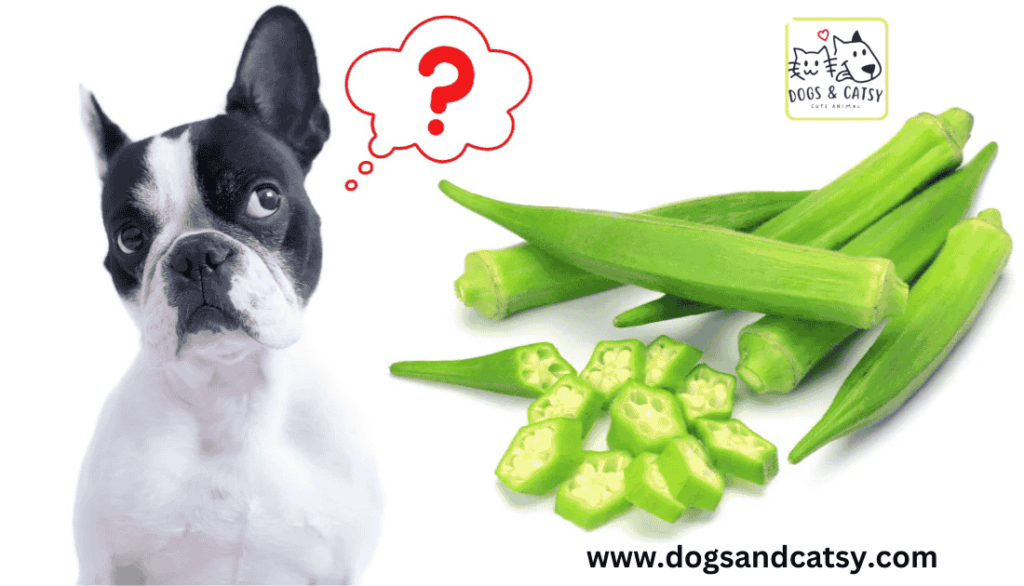Can Dogs Eat Okra? (Read What Vets Say!)

When wondering if dogs can safely eat okra, it’s important to know that okra is a nutrient-packed vegetable. Rich in fiber, vitamins, and antioxidants, it can aid in weight management and improve digestion.
However, okra should be introduced slowly to your dog as a new food, and always served cooked without seeds to prevent choking. Like any new food, it’s essential to monitor for adverse reactions, offering it in small portions to ensure your dog remains safe.
Can Dogs Eat Okra?
When considering if okra is a safe addition to your pet’s diet, it’s essential to maintain balance and ensure it’s the right choice for your dog. Pet parents should look into its nutritional benefits, but also carefully investigate the risks and avoid forbidden food.
Offering okra in appropriate preparations can provide your furry friend with healthy options while maintaining safety and balance in their overall diet. Let’s take a look.
What is Okra?
Okra, also known as lady’s finger, is a tall, flowering plant from the mallow family, prized for its seed pods, which are edible and green. Okra is widely consumed in cuisines from regions such as the southern United States, Caribbean, Africa, the Middle East, and India.
Also Read: Diet You Can Give to Your Puppy!
This popular food ingredient is known for its distinct, mild taste and slimy texture, often used as a thickening agent in soups and stews. Rich in vitamins, minerals, and dietary fiber, okra offers numerous health benefits, making it a versatile addition to many recipes.
Benefits of Feeding Okra to Dogs
Is okra good for dogs? Yes, it’s packed with nutrients, low in calories, and provides several health benefits.
Rich in Nutrients
According to the National Agricultural Library, raw okra is composed primarily of water, with low amounts of calories, protein, and fat, but it’s rich in fiber and carbohydrates. This makes okra a suitable snack for dogs, as it can support digestion and help with constipation or other gastrointestinal issues.
| Nutrient | Amount per 100g |
|---|---|
| Water | 90% |
| Calories | 33 |
| Protein | 1.9g |
| Fat | 0.2g |
| Fiber | 3.2g |
| Carbohydrates | 7.5g |
With its low calories and fat, it’s a great option for weight balance, and its fibrous texture can also help improve overall digestion, offering your dog a healthy treat full of natural proteins.
Rich in Vitamins and Minerals
Okra also contains the following essential nutrients:
- Calcium: 82 mg
- Iron: 0.62 mg
- Magnesium: 57 mg (14% of the Daily Value – DV)
- Phosphorus: 61 mg
- Potassium: 299 mg
- Sodium: 7 mg
- Zinc: 0.58 mg
- Copper: 0.109 mg
- Vitamin C: 23 mg (26% of the DV)
- Riboflavin: 0.06 mg
- Vitamin K: 31.3 µg
This vegetable is an excellent source of vitamins C and K, both of which support immune function and blood clotting in animals.
Also Read: Can Dogs Eat Nectarines? (Health Risks & Benefits)
Aids Digestion
The high fiber content of okra supports digestion and helps prevent bowel issues such as constipation, bloating, and diarrhea.
Boosts Immunity
The antioxidants in okra help boost dogs’ immune systems, preventing various health issues and potentially reducing the risk of cancer.
Low-Calorie Content
Plain okra can be a healthy snack for overweight dogs dealing with obesity and diabetes, as it is low in calories and high in fiber.
Risks of Feeding Okra to Dogs
While okra can offer many benefits to dogs, including aiding digestion, it’s essential to feed it with caution. Dogs may react differently to new food items, and feeding okra for the first time could lead to potential problems.

Always consult your veterinarian before introducing okra to ensure it’s a safe addition to your dog’s diet and won’t cause any health issues like:
- Choking hazard
- Allergy symptoms
- Bloating, gas, diarrhea, and other signs of gastrointestinal distress due to fiber content
- Obesity and heart issues, especially if served buttered, salted, or fried
- Pesticide residues
Choking Hazard
Okra’s fibrous texture and stems can be a choking risk for dogs with dental issues or those that swallow food without chewing.
Also Read: Can Dogs Eat Green Beans? (Risks and Benefits Guide)
Allergies
Some dogs may be allergic to okra, leading to symptoms like itching and digestive upset.
Too Much Fiber
Too much okra can cause digestive issues in dogs, including diarrhea, gas, and bloating.
Pesticides
Always wash vegetables like okra before serving to remove dirt, pesticides, or bacteria.
How Can I Safely Give Okra To My Dog?
- Okra can be a healthy treat for dogs when fed in small amounts, but it should not be given every day.
- If a dog eats too much okra, it may experience gas or other digestive issues.
- While raw okra can be served as a chew toy or treat, it’s better to offer cooked okra, as fried or fried foods with added seasonings are not recommended.
- Avoid garlic or onion in okra, as they are toxic to dogs and can lead to anemia.
Cooking Methods (Steaming, Boiling)
- Nutritionists recommend preparing okra the right way to retain the most nutrients and avoid overcooking it.
- The best methods for cooking okra are steaming or boiling for around 7 minutes to make it tender without breaking down essential vitamins.
- Avoid using oils, spices, or added seasonings that may upset your dog’s stomach or introduce harmful substances.
- Canned or pickled okra should be avoided due to high levels of preservatives and additives, which can be too harsh for a dog’s digestive system.
- Steaming is ideal for veggie softening, making it easier for dogs to digest and enhancing its texture for consumption.
- Some dogs may be sensitive to okra, so it’s important to introduce it gradually and observe for any signs of discomfort.
Avoiding Harmful Additives (Salt, Spices)
The cooking process for okra should avoid using spices, salt, or cooking oil, as excessive amounts can be harmful to dogs. Offering fried okra or okra cooked with butter may lead to gastrointestinal issues, such as bloating or diarrhea.
Also Read: Can Dogs Eat Peaches? (Health Benefits & Risks)
Additionally, garlic and onion-based seasonings are toxic and poisonous to dogs, causing severe health problems, including sodium ion poisoning and gastrointestinal distress. Therefore, it’s best to serve okra plain, cooked without harmful additives, for safe consumption.
Suitable Portion Sizes for Dogs
When preparing okra for your dog, it’s important to chop it into bite-sized pieces to prevent any choking hazards. Serving okra in small pieces is the best option, as it allows you to adjust portions based on your dog’s size.
Since okra is low in calories, it can be a safe and healthy treat, but it should always be considered in moderation to avoid excess calorie intake. Before introducing any new treat, it’s always wise to consult your vet to ensure it’s suitable for your dog’s diet.
Better Alternatives to Okra for Dogs
If you’re looking for dog-friendly veggies to offer your pet, there are many great alternatives to okra. These vegetables are not only safe for dogs but are also packed with essential nutrients that promote overall health. Here are some excellent options:
- Carrots – A crunchy, low-calorie snack that supports dental health.
- Cucumber – A refreshing, hydrating treat, especially on hot days.
- Celery – Packed with vitamins and low in calories, it’s great for weight management.
- Green Beans – High in fiber and beneficial for digestion.
- Beets – Rich in antioxidants, they help promote healthy blood flow.
- Edamame – Full of plant-based protein, perfect for active dogs.
- Asparagus – A nutrient-dense veggie that supports your dog’s immune system.
- Beans – Excellent source of protein and fiber, but make sure to cook them properly.
- Bell Peppers – Loaded with Vitamin C and great for boosting your dog’s immune system.
- Brussels Sprouts – Good for promoting digestive health, but should be served in moderation to avoid gas.
- Kale – High in vitamins A, C, and K, though should be fed sparingly.
- Peas – Packed with fiber and protein, supporting heart health.
- Spinach – Rich in iron and fiber but should be fed in moderation due to oxalates.
- Sweet Potatoes – A great source of fiber and beta-carotene, excellent for digestive health.
- Zucchini – Low in calories, making it a great snack for weight-conscious dogs.
Frequently Asked Questions
Can Dogs Eat Fried Okra?
No, While fried okra may be delicious for humans, it’s high in calories and salt, which can lead to heart problems and obesity in your dog. If your pup is begging for some, refrain from sharing this breaded okra and stick to healthier alternatives.
Can Dogs Eat Cooked Okra?
Yes, dogs can safely eat cooked okra. Be sure to serve it plain, without any added butter, salt, or seasonings, as these can be harmful to your pet.
Can Dogs Eat Boiled Okra?
Your dog can eat boiled okra as a healthy treat. They may also enjoy it mixed into their food for added flavor and nutrition.
Can Dogs Eat Pickled Okra?
No, dogs should never eat pickled foods. The vinegar used in pickling is too acidic for your dog’s digestive system, and pickled foods are high in salt, which can be harmful to their health. Avoid feeding your dog any pickled items to prevent digestive issues and salt toxicity.
Can Dogs Eat Raw Okra?
Dogs can technically eat raw okra, but it’s not the best option. Before offering it to your dog, make sure to wash it thoroughly to remove any pesticides, dirt, or debris. The slimy and gummy texture of uncooked okra can cause some dogs stomach distress or even an allergic reaction.
Additionally, raw okra can act as a thickening agent in human cuisines, which may not be ideal for your pet. It’s generally better to remove the seeds and serve fresh, properly cooked okra if you want to introduce this vegetable into your dog’s diet.
Can Dogs Eat Okra and Tomatoes?
Tomatoes are not toxic to dogs, but if you’re adding them to a meal with other ingredients, be cautious. Always avoid onions, garlic, and hot spices, as they can be harmful to your dog’s health. Stick to safe, dog-friendly foods to ensure their well-being.
Can Dogs Eat Okra Chips?
No, chips are not suitable for dogs as they contain high levels of salt and calories, which can lead to health issues like obesity and dehydration.
Can Dogs Eat Okra Seeds?
Yes, fortunately, dogs can safely eat okra seeds, so there’s no need to worry about removing them. Okra seeds are non-toxic and can be included in your dog’s diet without concern.
Can Dogs Eat Green Okra?
Yes, green okra should be served boiled without any extra additives. Okra comes in two varieties, green and red, but when cooked, red okra turns green. The only difference between the two is the color, as both are equally safe for dogs.
Can Dogs Eat Frozen Okra?
Yes, dogs can eat frozen okra, but make sure to cut it into smaller pieces and prepare it plain, without any additives. This ensures it’s safe and easy for your dog to digest.
Can Dogs Eat Roasted Okra?
Plain roasting is fine for dogs, but be sure to avoid adding extra oils, fats, or salt. These additives can be harmful to your dog’s health, so serve it in a simple, natural form.






